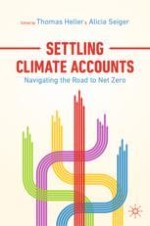2021 | OriginalPaper | Buchkapitel
3. Carbonwashing: ESG Data Greenwashing in a Post-Paris World
verfasst von : Soh Young In, Kim Schumacher
Erschienen in: Settling Climate Accounts
Aktivieren Sie unsere intelligente Suche, um passende Fachinhalte oder Patente zu finden.
Wählen Sie Textabschnitte aus um mit Künstlicher Intelligenz passenden Patente zu finden. powered by
Markieren Sie Textabschnitte, um KI-gestützt weitere passende Inhalte zu finden. powered by
